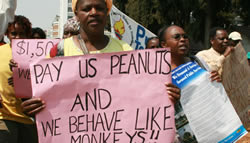ZIMBABWE
 With a General Election looming, the Zimbabwean Government has offered restive Public Servants additional incentives on top of a 17.5 per cent pay rise awarded just last month.
With a General Election looming, the Zimbabwean Government has offered restive Public Servants additional incentives on top of a 17.5 per cent pay rise awarded just last month.
Minister for Presidential Affairs and Monitoring Implementation of Government Programs, Simbarashe Mumbengegwi said negotiations had resulted in a signed agreement.
It included cash in lieu of leave for teachers who have accrued more than 123 days’ vacation leave; reduction and alignment of rentals at accommodation for PS staff; and consideration of “additional non-monetary benefits to enhance the conditions of service”.
The move comes after teachers’ leaders accused the Government of playing favourites by increasing the salaries of the country’s military and police, while ignoring the rest of the Public Service.
Secretary-General of the Zimbabwe Teachers Association (Zimta), Tapson Sibanda said the Government was discriminating when it awarded a 22.5 per cent rise to the military and 20 per cent to the police.
“Zimta condemns in the strongest terms the lack of seriousness and commitment by this Government and warns of serious consequences,” Mr Sibanda said.
“The Government is devaluing all the professions outside state security.”
He asked whether this was the first step in the “devaluation and death of education in Zimbabwe”.
He was supported by the Secretary-General of the Progressive Teachers Union of Zimbabwe, Raymond Majongwe, who said his members were dismayed by the Government’s preferential treatment.
“Senior members in the education sector get far below their counterparts in other Ministries,” Mr Majongwe said.
“The differences are too glaring to ignore and as a union we believe such discrepancies are not only unacceptable but also scandalous.”
The Government has faced multiple cases of industrial action staged by restive PS employees over calls for improved working conditions and better pay.
It hit back by firing striking nurses, saying that it could not allow hospitals, children’s centres and emergency services to be crippled by their actions.
Harare, 19 July 2018


